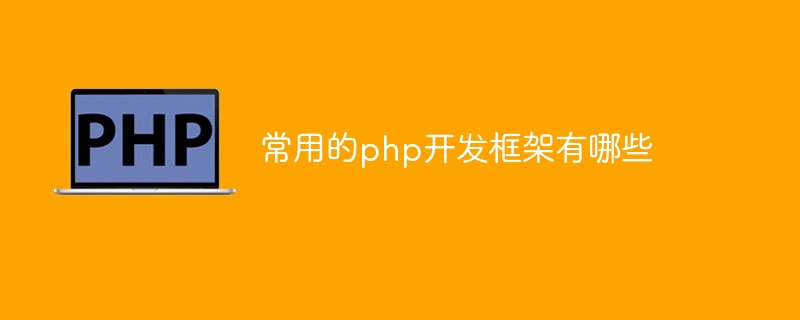What are the commonly used PHP development frameworks?
Commonly used PHP development frameworks include Laravel, Symfony, CodeIgniter, Yii, Phalcon, CakePHP and Slim, etc. Detailed introduction: 1. Laravel is an elegant PHP web application framework. It provides simple and elegant syntax and rich functions, such as routing, ORM, template engine, etc. Laravel has an active community and complete documentation, and is widely used. Recognized as one of the best frameworks in PHP development; 2. Symfony, etc.

The operating environment of this article: Windows 10 system, PHP8.1.3 version, Dell G3 computer.
PHP is a widely used server-side scripting language for developing web applications. In PHP development, using frameworks can improve development efficiency, code maintainability and security. The following are some commonly used PHP development frameworks:
Laravel: Laravel is an elegant PHP web application framework that provides simple, elegant syntax and rich features, such as routing, ORM, template engine, etc. Laravel has an active community and complete documentation, and is widely recognized as one of the best frameworks for PHP development.
Symfony: Symfony is a high-performance PHP framework that provides a set of components and tools for quickly building scalable web applications. Symfony's design philosophy is flexible, configurable and extensible, and can meet the needs of various projects of different sizes and complexity.
CodeIgniter: CodeIgniter is a lightweight PHP framework that is simple, fast and flexible. The core principles of CodeIgniter are to keep it minimal, efficient, and simple, but still provide rich functionality such as database abstraction layer, form validation, etc.
Yii: Yii is a high-performance PHP framework with powerful caching support and rich features, such as database abstraction layer, RESTful API support, etc. Yii's design philosophy is simple, efficient and scalable, aiming to provide the best development experience.
Phalcon: Phalcon is a full-stack PHP framework that is provided as a C extension with excellent performance and low resource consumption. Phalcon supports MVC architecture and ORM, providing rich functions and easy-to-use API.
CakePHP: CakePHP is a mature PHP framework that provides powerful functions and flexible architecture. CakePHP follows the MVC pattern and provides database abstraction layer, form validation, security and other functions, and is suitable for the development of small and medium-sized web applications.
Slim: Slim is a lightweight PHP micro-framework that focuses on quickly building simple APIs and web applications. Slim has a simple routing and middleware system, suitable for projects that need to quickly build APIs.
These frameworks have their own characteristics and advantages. It is very important to choose the framework that suits your project needs. At the same time, understanding the usage and best practices of these frameworks can improve your development skills and work efficiency.
The above is the detailed content of What are the commonly used PHP development frameworks?. For more information, please follow other related articles on the PHP Chinese website!

Hot AI Tools

Undresser.AI Undress
AI-powered app for creating realistic nude photos

AI Clothes Remover
Online AI tool for removing clothes from photos.

Undress AI Tool
Undress images for free

Clothoff.io
AI clothes remover

AI Hentai Generator
Generate AI Hentai for free.

Hot Article

Hot Tools

Notepad++7.3.1
Easy-to-use and free code editor

SublimeText3 Chinese version
Chinese version, very easy to use

Zend Studio 13.0.1
Powerful PHP integrated development environment

Dreamweaver CS6
Visual web development tools

SublimeText3 Mac version
God-level code editing software (SublimeText3)

Hot Topics
 1382
1382
 52
52
 PHP 8 JIT (Just-In-Time) Compilation: How it improves performance.
Mar 25, 2025 am 10:37 AM
PHP 8 JIT (Just-In-Time) Compilation: How it improves performance.
Mar 25, 2025 am 10:37 AM
PHP 8's JIT compilation enhances performance by compiling frequently executed code into machine code, benefiting applications with heavy computations and reducing execution times.
 OWASP Top 10 PHP: Describe and mitigate common vulnerabilities.
Mar 26, 2025 pm 04:13 PM
OWASP Top 10 PHP: Describe and mitigate common vulnerabilities.
Mar 26, 2025 pm 04:13 PM
The article discusses OWASP Top 10 vulnerabilities in PHP and mitigation strategies. Key issues include injection, broken authentication, and XSS, with recommended tools for monitoring and securing PHP applications.
 PHP Secure File Uploads: Preventing file-related vulnerabilities.
Mar 26, 2025 pm 04:18 PM
PHP Secure File Uploads: Preventing file-related vulnerabilities.
Mar 26, 2025 pm 04:18 PM
The article discusses securing PHP file uploads to prevent vulnerabilities like code injection. It focuses on file type validation, secure storage, and error handling to enhance application security.
 PHP Encryption: Symmetric vs. asymmetric encryption.
Mar 25, 2025 pm 03:12 PM
PHP Encryption: Symmetric vs. asymmetric encryption.
Mar 25, 2025 pm 03:12 PM
The article discusses symmetric and asymmetric encryption in PHP, comparing their suitability, performance, and security differences. Symmetric encryption is faster and suited for bulk data, while asymmetric is used for secure key exchange.
 PHP Authentication & Authorization: Secure implementation.
Mar 25, 2025 pm 03:06 PM
PHP Authentication & Authorization: Secure implementation.
Mar 25, 2025 pm 03:06 PM
The article discusses implementing robust authentication and authorization in PHP to prevent unauthorized access, detailing best practices and recommending security-enhancing tools.
 PHP CSRF Protection: How to prevent CSRF attacks.
Mar 25, 2025 pm 03:05 PM
PHP CSRF Protection: How to prevent CSRF attacks.
Mar 25, 2025 pm 03:05 PM
The article discusses strategies to prevent CSRF attacks in PHP, including using CSRF tokens, Same-Site cookies, and proper session management.
 How do you retrieve data from a database using PHP?
Mar 20, 2025 pm 04:57 PM
How do you retrieve data from a database using PHP?
Mar 20, 2025 pm 04:57 PM
Article discusses retrieving data from databases using PHP, covering steps, security measures, optimization techniques, and common errors with solutions.Character count: 159
 PHP API Rate Limiting: Implementation strategies.
Mar 26, 2025 pm 04:16 PM
PHP API Rate Limiting: Implementation strategies.
Mar 26, 2025 pm 04:16 PM
The article discusses strategies for implementing API rate limiting in PHP, including algorithms like Token Bucket and Leaky Bucket, and using libraries like symfony/rate-limiter. It also covers monitoring, dynamically adjusting rate limits, and hand




